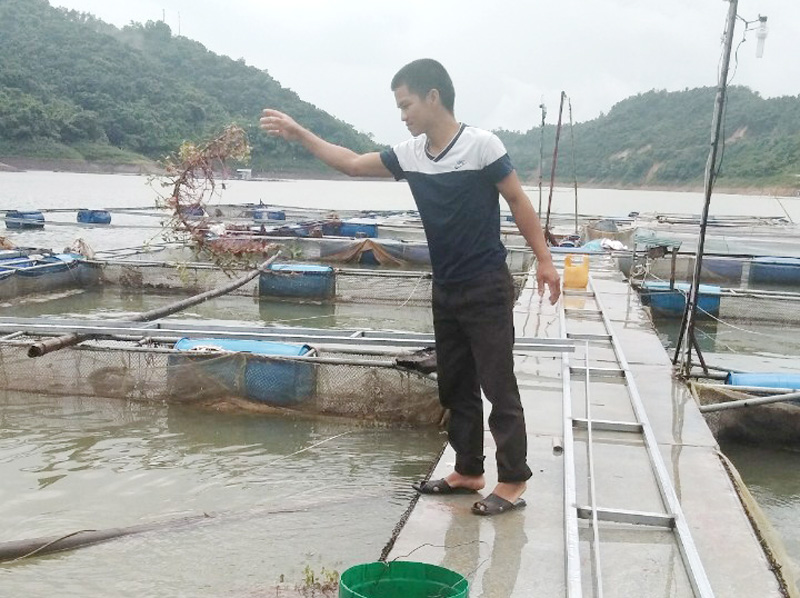
(HBO) - That fisherman is Mr. Dinh Van Linh in Trang village, Binh Thanh commune, Cao Phong district. From his experience, he not only enriched by himself but also "dragging" hundreds of households to be back for fish cage raising.

Raising cage fish, Mr. Linh earns hundreds of
millions of dongs a year.
In 2014, he followed a few households in the
village to invest in raising cage fish. Besides the effort and materials such
as his own bamboo, Luong trees, he spent more than 10 million VND buying grass
carps, black carps and net to raise 2 first cages. After a few months of good
care, fish grew up fast. In early May, when the first rains fell, the water in
the streams flowed into the river. The water was muddy with many impurities, so
the fish in his cage died out. Do not be discouraged, in the following year; he
continued to invest his capital in building more cages with more than 30
million VND. Just like last year, after several months of efforts, his fish
died and had to be sold out in the market. At this time, he realized that most
of the fish in the farms near the lakeside was dead. When he came far away from
the bank to get the water, he found that the water there was still clean. He
went to Thuy Nai commune to learn about fish farming and found that some
fishermen raising fish near the bank also had their fish died due to lack of
oxygen. Only one household carrying cages far away from the bank did not have
fish died.
In 2016, he borrowed more capital to continue
investing in raising 10 cages and dragging cages offshore. However, the daily
care tasks were more difficult, for example, transporting food and protecting
the fish but it is safe for the fish at the beginning of the rainy season.
Later that year, he earned nearly one hundred million VND from his fish cages.
Raising successfully, with encouragement, he continued to borrow more capital
to invest in 20 fish cages. From bamboo or Luong cages, he bravely invested in
iron cages. Each year, his family exports more than 4 tons of commercial fish
to the market, earning hundreds of million VND.
From the successful implementation of Mr.
Dinh Van Linh, many people in the village have learned to drag away their cages
to raise fish. At present, the cage fish farming Cooperative of Binh Thanh
Commune operated by him has 23 households participating to raise cage fish with
hundreds of cages. Each year, the Cooperative produces several tonnes of fish,
creating jobs for nearly 100 workers. Many households has become rich and had a
stable life from that.
Dao Village’s honey – a product certified with a 3-star OCOP (One Commune One Product) rating by Thong Nhat Agricultural Cooperative in Dao Village (Hoa Binh City) – is highly regarded by consumers for its quality, richness, and variety in packaging. The distinctively sweet taste of Dao Village’s honey leaves a lasting impression on anyone who has tried it.
In alignment with Project No. 07-DA/TU, issued by the Hoa Binh provincial Party Committee on November 1, 2021, Lac Thuy district has actively promoted investment and supported the sustainable development of its industrial and handicraft sectors during the 2021–2025 period. Alongside this, the district has remained committed to preserving and revitalising traditional craft villages.
Located in the northern part of Lac Thuy district, with a temperate climate and fertile soil, Phu Thanh commune has great potential and advantages in growing tea. The long-standing experience, combined with strict adherence to organic farming practices in the tea gardens, ensures that the dried tea products from Phu Thanh and Lac Thuy as a whole are sold out immediately upon production, providing a stable and prosperous life for the local people.
Amid efforts to streamline the administrative apparatus, Hoa Binh province has intensified measures to address challenges in land clearance, resettlement support, and infrastructure investment, aiming to speed up the progress of key projects.
Hoa Binh province has posted an unprecedented economic growth rate of 12.76% in the first quarter of 2025, marking its highest quarterly performance to date and positioning it as the second fastest-growing locality in the country, trailing only Bac Giang province.
Under current regulations, products in the One Commune – One Product (OCOP) programme that are rated three stars or higher must undergo re-evaluation every three months. However, in reality, some of these products fail to consistently meet the required standards, raising concerns about the sustainability of their OCOP certification. This underscores the urgent need for producers to enhance product quality and gradually develop their OCOP products into strong, marketable brands.



